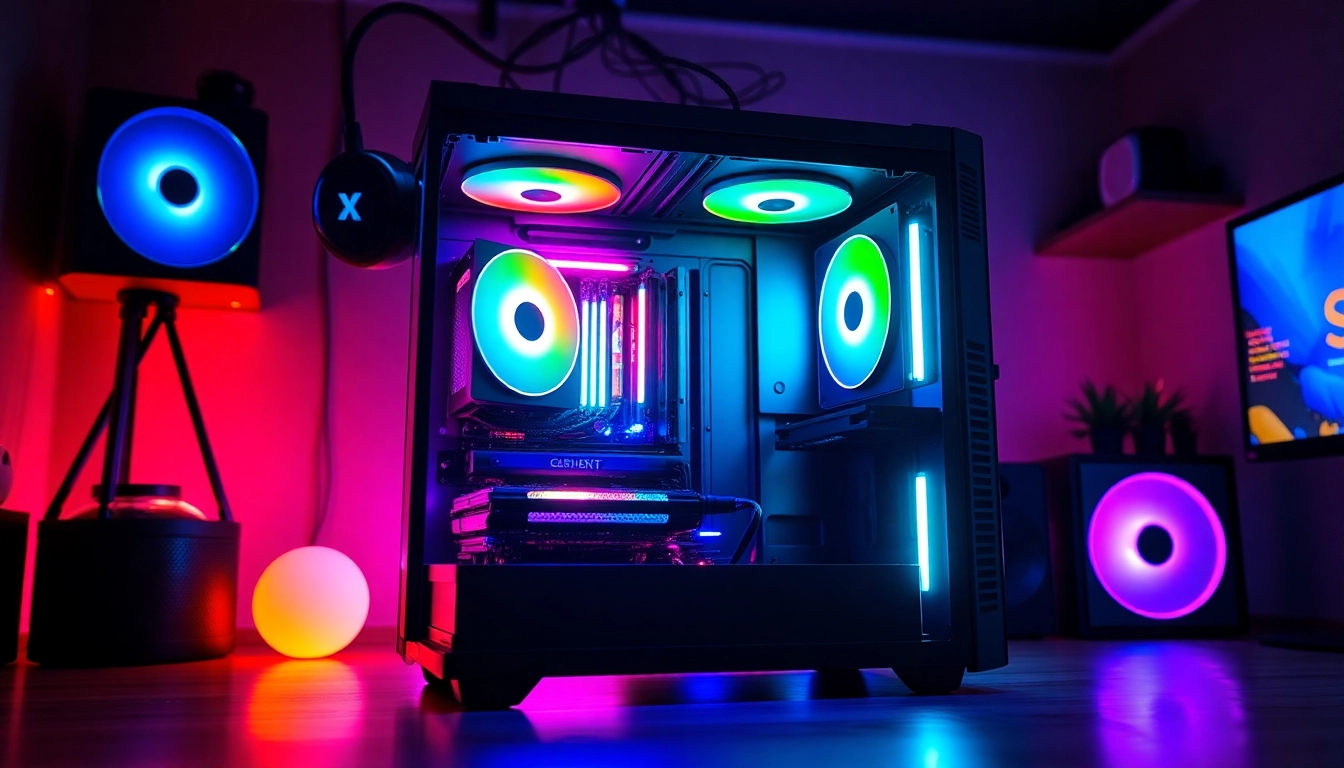Understanding the Importance of a Custom Gaming PC Case
In the world of PC gaming, the aesthetics and functionality of your rig can make a significant difference. When assembling a gaming computer, the custom gaming pc case you choose serves as the foundation for both performance and style. A well-designed case not only supports optimal hardware configurations but also showcases your unique personality and preferences as a gamer.
Why a Custom Design Matters
A custom gaming PC case signifies more than just a way to house your components; it reflects your style. Today’s gamers crave individuality, and a custom case provides that opportunity. Unlike standard cases, custom options allow for unique designs, materials, and finishes that can embody your gaming ethos, be it sleek, cyberpunk, retro, or themed around your favorite game.
Benefits of Personalization
The personalization potential with custom cases is vast. Such cases often provide the following benefits:
- Visual Appeal: With various textures, colors, and patterns available, you can create a PC that turns heads.
- Improved Functionality: Custom cases can be designed specifically for enhanced airflow, cable management, and component accessibility, improving the overall build quality.
- Compatibility: Tailored cases ensure that your hardware fits perfectly, reducing the risk of fitting issues that might occur with generic cases.
Choosing the Right Size and Form Factor
Choosing the right size for your custom gaming PC case is crucial. Consider the following form factors:
- Full Tower: Ideal for advanced gaming setups with multiple graphics cards and cooling systems.
- Mid Tower: A balanced option for gamers who need a mix of performance and compactness.
- Micro ATX and Mini ITX: Perfect for those who prioritize space efficiency, often in more casual or budget-focused setups.
Make sure your selected case size aligns with your components and future upgrades.
Top Features to Look for in Custom Gaming PC Cases
Ventilation and Cooling Options
Efficient cooling is paramount for ensuring the longevity and performance of your gaming rig. Look for cases that support:
- Multiple Fans: The ability to house several case fans can drastically improve airflow.
- Liquid Cooling Support: If you’re considering liquid cooling, ensure the case can accommodate radiators.
- Airflow Design: Select cases with mesh panels or adjustable fan brackets to optimize airflow.
Material Choices: Metal vs. Acrylic
When it comes to materials, you generally have two robust options—metal and acrylic. Each material has its pros and cons:
- Metal: Known for durability and heat resistance, metal cases tend to provide better protection for components.
- Acrylic: Lighter and often more visually appealing, acrylic can showcase your internal components beautifully. However, it is more prone to scratches and less durable than metal.
Ultimately, your choice will depend on your priorities between appearance, durability, and weight.
Design Aesthetics and Customization Options
Today’s market allows for extraordinary design options. Consider cases that offer:
- Custom Paint Jobs: Unique designs that reflect your personal taste.
- LED Lighting: Integrated lighting systems that can be customized in terms of color and effects.
- Panel Options: Interchangeable side panels for redesigning your case’s look at any time.
These features enable you to create a gaming setup that is genuinely unique and tailored to your tastes.
Popular Styles of Custom Gaming PC Cases
Full Tower vs. Mid Tower
When choosing the style of your gaming PC case, one of the first decisions is between a full tower and mid tower case:
- Full Tower: Generally provides the most space and expandability. Perfect for elaborate setups with numerous high-performance components.
- Mid Tower: A versatile option that balances size and capability, suitable for most gaming builds.
The choice largely depends on your specific hardware needs and available space.
Unique Themed Cases
Themed cases are an exciting way to elevate your PC’s design. Many companies and custom builders offer cases inspired by popular video games, anime, or movie franchises. These cases can dramatically enhance the visual appeal of your rig and create an immersive gaming station experience.
Modular and DIY Customization
For the more adventurous, modular cases allow for extensive customization. DIY kits let you build and adapt your case layout to your preferences. These modular options support various cooling setups, aesthetics, and component placements, giving you unprecedented control over your build.
Step-by-Step Guide to Building Your Custom Gaming PC
Selecting Components for Optimal Performance
A successful gaming PC build starts with selecting compatible components. Key elements include:
- CPU: Choose a powerful processor that can handle modern gaming and multitasking demands.
- GPU: Ensure your graphics card can enable high frame rates for the latest games at your desired resolution.
- Motherboard: Select a motherboard that matches your CPU and has enough ports for your peripherals.
- RAM: Aim for at least 16GB of RAM for gaming, with options to add more if necessary.
- Storage: A combination of SSDs for speed and HDDs for capacity often yields the best performance.
Assembly Tips for First-Time Builders
Building your gaming PC can seem intimidating, especially for first-timers. Here are essential assembly tips:
- Read Manuals: Always start by thoroughly reading the manuals for your components.
- Static Precautions: Use an anti-static wrist strap to avoid damaging your parts.
- Plan Your Cable Management: Organize your cables during assembly to enhance airflow and maintain a clean build.
- Be Patient: Take your time during the assembly process—rushing can lead to mistakes.
Final Touch: Lighting and Aesthetic Enhancements
After successfully assembling your gaming PC, consider aesthetic enhancements to elevate the overall appearance. Options include:
- RGB Lighting: Use addressable RGB strips to create dynamic color schemes throughout your build.
- Custom Sleeved Cables: Opt for high-quality, color coordinative cables for a cleaner look.
- Sound Dampening: For quieter performance, incorporate sound-dampening materials into your case.
Maintaining Your Custom Gaming PC Case
Cleaning and Upkeep Best Practices
Maintaining your custom gaming PC case is essential for performance and longevity. Regular cleaning helps prevent dust buildup:
- Dust Filters: Invest in cases with built-in dust filters and clean them regularly.
- Interior Cleaning: Use compressed air to blow dust off components and ensure efficient cooling.
- Exterior Care: Wipe the case exteriors with a microfiber cloth to maintain their appearance.
Upgrading Components Over Time
Technology evolves quickly, and your gaming needs will likely change. Here are tips for upgrading:
- Compatibility Checks: Ensure new components are compatible with your existing setup to avoid issues.
- Future-Proofing: Consider investing in higher-end components initially to extend the life of your build.
- Monitor Performance: Track performance metrics to identify when upgrades are necessary.
The Importance of Monitoring Temperatures
Keeping an eye on the temperatures of your components is critical for performance. Use software tools to monitor:
- CPU and GPU temperatures: High temperatures can throttle performance and shorten lifespan.
- Ambient temperatures: Ensure your room temperature supports optimal hardware functioning.
- Heat Management Solutions: If temperatures rise too high, consider enhanced cooling options like aftermarket coolers or optimizing airflow.



